

Finally, you have before you a simple, concise explanation of how humanity has been cheated out of its freedom and prevented from achieving its true unlimited potential… simply because people believe a few long repeated lies. If you long to end the tyranny of the rich and crave justice and equality, this may be the most important article that you will ever read.
Lie Number 1: Debt Is Necessary
We have been taught to believe that it is impossible to build new major assets without upfront financing. The money to pay for the supplies and labour that is needed for a project “must” be on hand before the project can start. Even though sufficient human and natural resources are idle and available, new productivity cannot occur without the permission of capital. All new assets “must” originally belong to the suppliers of capital. Alternative methods to finance productivity are quickly discredited and never given serious consideration.
Large projects are very expensive, so individuals cannot afford to finance them on their own. They must find investors and use the money of others before the creation of new assets can begin. The largest portion of project financing is usually bank debt. Private investors can also provide equity capital and normally they expect an even higher rate of return than current bank lending rates.
We have also been taught to believe that financing is necessary in order to acquire or transfer new major assets like homes and cottages, cars and trucks and equipment and machinery. All of the production costs of a product “must” be paid upfront before the ownership of the product is transferred. Working people can’t possibly save enough upfront to pay for the entire cost of a house. For low-paid workers, even a lifetime of wages wouldn’t be enough. So we accept the “need” to borrow and submit to the “need” to pay interest charges.
We have also been taught to believe that the money we receive when we borrow belongs to the lender who forgoes using the money himself for his own convenience. This is completely untrue. Most of the new credit created by banks and corporations is brand new money created electronically out of thin air by a loan agreement. Every dollar that existed before the new loan was created still exists independently from the new loan. No one else’s money was touched. Most new loans inflate the total money supply. Some private personal loans may simply transfer savings of the lender to the borrower without increasing the money supply but it is ridiculous to say that the lender is forgoing his own use of the money. In reality, he is using it himself to generate interest revenue and increase his income.
The significance of lie number one is enormous
Lie Number 2: Interest Is Necessary
We have been taught to believe that the charging of interest is justified as a reward to the lender for risking his private capital. The plans and intentions of the borrower may not work out and the lender’s capital might be lost. As pointed out above however, most loan capital is created out of thin air. The new credit previously belonged to no one so no private capital is at risk. New bank loans actually create public capital that is expropriated by the banks who claim to own it. As we have seen many times, if the banks get into trouble and too many loans become unrepayable, the government is ready to step in with taxpayer bailouts to purchase the bad debts at their face value. Where is the risk to the banks?
People who earn interest on their investments believe that interest is helping them "get ahead". Interest income gives them more money to spend, so it must be good. But it's only good if it gives them more income than it costs them to get it. If I earn $100 in interest income but the cost of interest that's embedded in the prices of all the things I buy is $150, then I'm not really getting ahead at all. I'm losing $50. I would actually have more purchasing power, if interest was abolished. A German study by Margrit Kennedy (1995) found that as much as 70% of prices were due to embedded interest costs.
If you look at the distribution of interest income and expenses in the economy, it becomes glaringly obvious that the household sector (that's individuals and families) are the big losers of the interest game. The household sector ultimately pays all of the interest costs in the economy. They pay their own interest costs on mortgages, loans and consumer credit. But they also pay all of the corporate sector's interest costs which are embedded into consumer prices. Plus they pay all of the government sector's interest costs which are embedded into taxes. Interest costs the household sector about 3 times the income that it generates. Clearly the household sector would be better-off financially without interest.
The significance of lie number two is enormous
Lie Number 3: Profit Is Necessary
We have been taught to believe that without profit there would be little or no incentive to invent, create or produce. Profit is deemed to be justified as a reward for initiative and for risking the use of private capital. This is always presented as an indisputable fact or axiom. Without the profit incentive, the abundance and variety of products and services would stagnate. Society would be static and devoid of variety and excitement. Obviously then, profit is a huge benefit to society... or is it?
Most individuals and small businesses that earn a profit pay far more in embedded profit costs than they earn. The very cornerstone of investment ideology," buy low and sell high", is merely a crude camouflage for inflation. Simply flipping existing assets for a higher price is totally unproductive. No new tangible assets are created in the process. For example, look at the price of real estate. As the existing housing stock ages and wears out, rather than depreciating its value accordingly, property owners constantly attempt to inflate resale prices to the maximum the market will bear. How does inflating the prices of stocks, bonds, commodities or any other existing asset contribute to building a better, more productive society? It certainly accelerates inflation and the need for more debt. In order to keep the value of our assets increasing, the value of our liabilities must also increase. Our accounting system demands it. Profit and debt are two sides of the same coin. You can’t have one without the other.
The rabid quest for profit is now actually cannibalizing our society. Existing productive assets are intentionally left idle to constrict market supply and inflate prices. Many of today's new investments are simply corporate takeovers of existing businesses intended solely to eliminate competition, consolidate market share and control market prices. The tremendous social costs of profit are now becoming obvious as more and more plants shut down and formerly productive citizens lose their jobs.
The significance of compound profit is enormous.
Every good or service offered in the marketplace relies on a complex series of interwoven supply chains. Every producer requires the goods and services of many other producers to operate their business. If all producers are trying to recoup all of their operating costs, plus are adding a profit, on top of their costs, to their own selling price, then the total amount of profit that is embedded into the selling price of every good or service that we buy compounds continuously as it moves along the chain of production. Now that globalization is so entrenched, raw materials, components, manufacturing and assembly operations, shipping and distribution routes, criss-cross the world many times before goods enter local retail channels. Production interdependencies alone can often loop through 10 or 20 levels.
The effect that compound profits have on prices is identical to the effect that compound interest charges have on borrowing costs. Compound profits, however, are much more harmful to consumers. Compound interest charges take years to inflate consumer costs, compound profits inflate costs immediately. Financial advisors often use a Rule of 72 (or Rule of 70) to estimate the approximate future value of an investment. This is how it works. If you divide the rate of return, or the interest rate, into the number 72 (or 70) the number you get is the approximate number of years that it would take for your investment to double in value. For example, an investment that earns 6% per year would take about 12 years to double in value (72/6=12). An investment that earns 10% per year would take only about 7.2 years to double in value (72/10=7.2). With an average supply chain profit rate of 10%, it takes only 8 levels to double the selling price of a product and only 12 levels to triple it. Many products produced in the labour ghettos of the Third World have profit margins that make up 90% of the selling price.
Profit and interest are identical twins. The only real difference is that interest rewards lenders at a fixed, pre-determined rate while profit rewards shareholders at a fluctuating, but normally higher rate. Nevertheless, the idea that profit is fair has been deeply planted in our collective consciousness and the mainstream media reinforces the idea constantly. Day after day, it seduces us with the allure of excessive wealth and ever so subtly transfers the responsibility for our failure to reach the top directly onto our own shoulders. If only we were smarter, or more hardworking, or better looking, or more popular, then we too could be successful and earn the fabulous incomes of the rich and famous. But it's all an illusion, the game is rigged and the odds of winning are next to none.
Please stop and seriously consider the scale of the economic lies that control all life on earth. The public’s acceptance of the concept of a billionaire is a good example of how thoroughly we have been duped and morally drained. It is impossible to earn $1 billion dollars honestly. Even if you charge $500/hour and you bill 2,000 hours per year (40 hrs/wk X 50 wks/yr) your annual income will only be $1 million… it would take 1,000 years for you to become a billionaire (ignoring expenses). Anyone who claims to be a billionaire is either 1) lying or 2) stealing money from a whole lot of other people.
The richest people on earth now claim to own fortunes worth hundreds of billions of dollars. Could their professional incomes have really started 100,000 years ago? Even billing $1million/hour X 2,000 hours/year, it would take 50 years to gross $100 billion. $1million/hour is 50,000 times a minimum wage of $20/hour, and 20,000 times a middle income wage of $50/hour.
Are there really super-humans worth that much more than the rest of us?
The Honest Truth: Part Two will suggest solutions to disable the sources of the elites' wealth and power. Without taking that most important first step they will continue their relentless attacks against the rights and resources of the Commonwealth. Fighting individual components of their agenda for absolute control is futile. Their wealth and influence is too fluid to be stopped. It simply adapts and moves around any resistance it encounters. We must disable it at its source. It is relatively easy to do once we overcome the belief that it is impossible.
